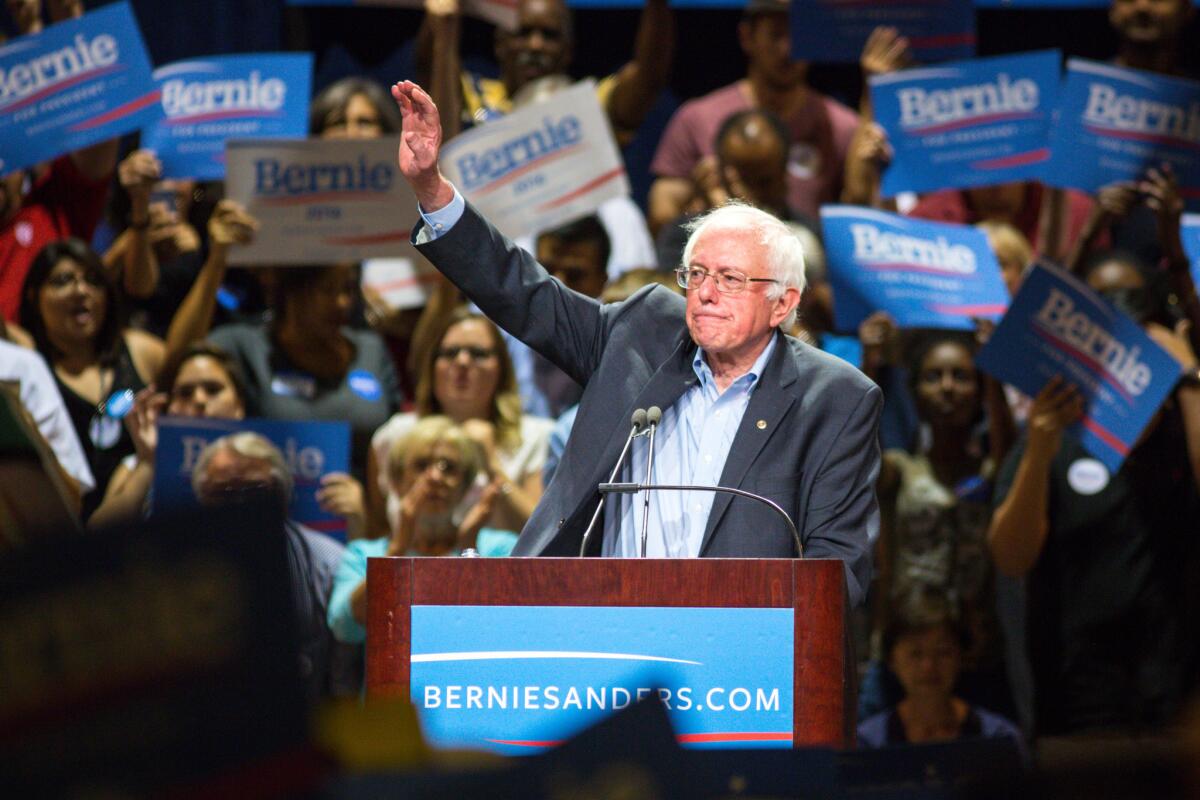Sanders, O’Malley face protesters at Netroots Nation conference

Sen. Bernie Sanders speaks to the crowd at the Phoenix Convention Center.
- Share via
Reporting from Phoenix — The annual Netroots Nation political conference, being held here this year, isn’t just supposed to be friendly to progressive candidates. It is an applause-filled jaunt that can add luster to campaigns whose candidates want to be standard-bearers of the liberal wing of the Democratic Party.
That was far from the case on Saturday, the showcase day of the five-day event that began Wednesday, as former Maryland Gov. Martin O’Malley and Sen. Bernie Sanders of Vermont found themselves face-to-face with protesters, led by supporters of the Black Lives Matter movement.
Black Lives Matter was fueled by several high-profile deaths of unarmed black men at the hands of police in the last two years, and the slogan has been the rallying cry for a series of protests calling for social justice.
Saturday’s verbal confrontation first came during O’Malley’s town hall meeting.
He had just delivered what should have been applause lines at such a conference — closing for-profit prisons and ending wealth inequality — when about 30 protesters streamed into the Phoenix Convention Center’s main hall and began shouting questions:
“What are you doing to stop the killing of black men?”
“Do black lives matter to you?”
Seated onstage, hands clasped and elbows on his knees, O’Malley in response turned his speech over to related issues: creating civilian review boards for police departments, pushing through criminal justice reform and asking the same of other candidates. A protester was invited on stage.
“I recognize the pain and grief throughout country, to all the lives lost to violence,” O’Malley said, to tepid applause, before expounding on the efforts he made when he was mayor of Baltimore to end an epidemic of violence and drug abuse.
Then, after the 15-minute interruption, O’Malley said, “Black lives matter, white lives matter, all lives matter.”
He was roundly booed. He repeated the line. More boos followed. He eventually waved to the crowd as he left the stage.
Sanders next took the stage with the protest in full swing, but nevertheless muscled his way through. He scoffed at questions about what he has done for the civil rights movement, replying that he’s spent 50 years fighting for civil rights.
“We need a political revolution in this country,” said Sanders, sticking to the grass-roots progressive message that has earned him crowds in the tens of thousands at appearances across the country.
The difference, said conference attendee Lexis Clark of Chicago, was that O’Malley seemed to waffle and waver during the protest, while Sanders, used to long, loud debates, simply boomed his way through the interruptions.
“I wasn’t blown away” by O’Malley, said Clark, 30. “He didn’t do a very good job controlling it.”
To the protesters themselves, neither candidate did much to assure them that the goals of the Black Lives Matter movement would be considered.
“They all fumbled when we brought black issues to the table,” said Ashley Yates, 30, one of Saturday’s protest leaders. “That was by design.”
It wasn’t the first time a presidential candidate has been roundly booed at the conference. At the 2007 event, Hillary Rodham Clinton, in her first presidential campaign, heard boos for being too centrist and for voting in favor of the Iraq war. She skipped this year’s event.
The conference, held this year in Phoenix in an attempt by organizers to plant a flag in a red state, issued a statement less than an hour after Saturday’s protest to say it “stands in solidarity with all people seeking human rights.”
“Our aim was to give presidential candidates a chance to respond to the issues facing the many diverse communities represented here,” conference organizers said in an email. “Although we wish the candidates had more time to respond to the issues, what happened today is reflective of an urgent moment that America is facing today.”
Yates was unconvinced.
While candidates’ plans on issues such as banking reform and wage inequality have specifics — whom they would appoint, what steps they would take on Day One — they’ve been vague when it comes to pushing for racial and social justice.
“You can’t hold anyone accountable for something they haven’t agreed to yet,” Yates said, adding that Netroots, for all its progressive leanings, remained a largely white space.
“Let’s be honest: It’s mostly white, concerning white issues,” Yates said, “when we are out here dying.”
Twitter: @nigelduara
More to Read
Sign up for Essential California
The most important California stories and recommendations in your inbox every morning.
You may occasionally receive promotional content from the Los Angeles Times.











